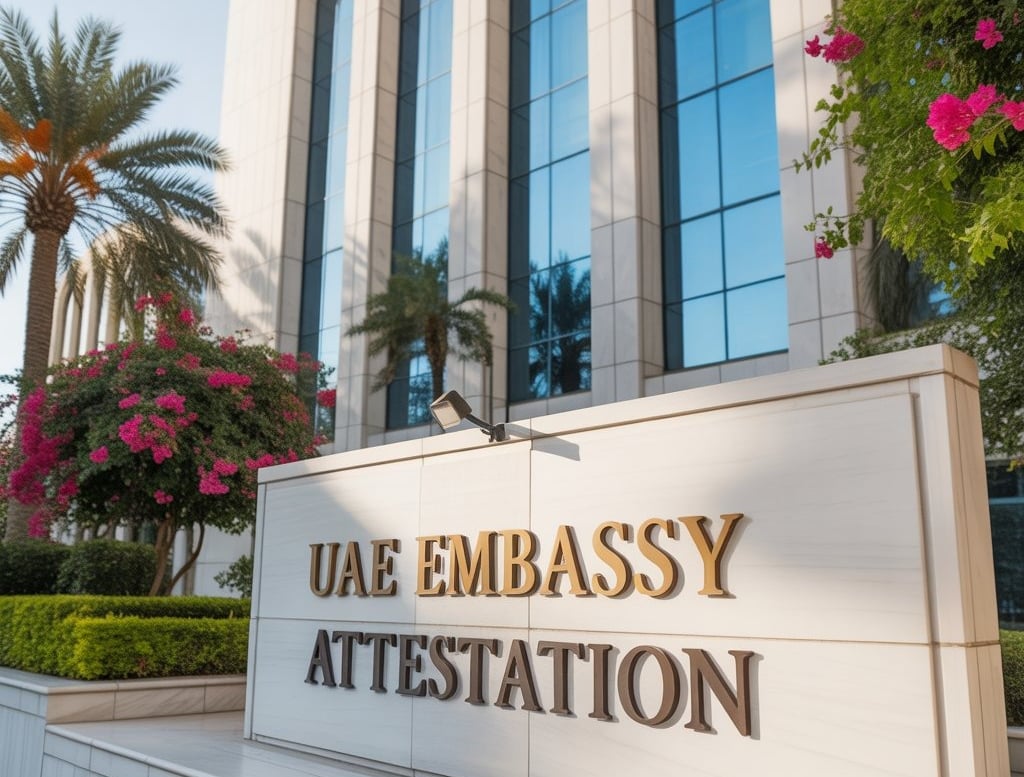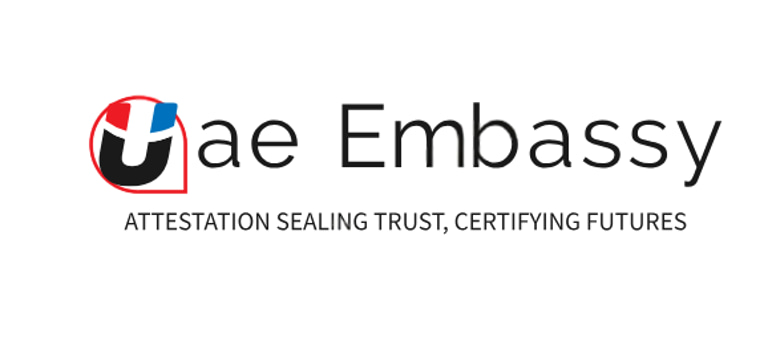UAE Embassy Attestation Process 2025 Guide
Discover the latest guidelines for the UAE embassy attestation process in 2025, including costs, timeframes, and essential information you need to know for a smooth experience.
10/11/20257 min read


Introduction to UAE Embassy Attestation
Embassy attestation is a crucial process for individuals seeking to validate their documents for various purposes in the United Arab Emirates. It involves obtaining an official verification from an embassy or consulate, confirming that a particular document, such as educational certificates, marriage licenses, or employment letters, is legitimate and requires recognition by local authorities for use in the UAE. The necessity of having documents attested arises primarily in contexts related to employment, education, and immigration, which are pivotal in today's globalized world.
The embassy attestation serves as a safeguard against forgery, ensuring that the documents submitted are authentic and verifiable. For expatriates looking to work or study in the UAE, the process of attestation is often a prerequisite, providing legal assurance to prospective employers or educational institutions regarding the individual’s credentials. Moreover, the process is integral to the immigration systems, as many visa applications necessitate that supporting documents be duly attested, reflecting their validity.
As we step into 2025, staying informed about the latest guidelines surrounding the UAE embassy attestation process remains vital. The rules and requirements can evolve, influenced by changes in immigration policies, international relations, or advancements in document verification technologies. Keeping abreast of such updates will ensure that individuals are well-prepared for their applications and avoid potential delays associated with non-compliance. Therefore, understanding the significance of embassy attestation not only facilitates a smoother entry into UAE but also enhances the overall experience in navigating administrative tasks relating to employment, education, and residency.
Understanding the Attestation Process
The UAE embassy attestation process is crucial for validating documents intended for use in the United Arab Emirates. This procedure is often necessary for various types of documents, including educational certificates, marriage certificates, and commercial documents. The primary aim of attestation is to verify the authenticity of these documents in order to uphold legal standards in the UAE.
The attestation process typically begins with obtaining the necessary approvals and certifications from the original issuing authority. For educational documents, this generally means verifying that the certificate was issued by a legitimate institution recognized by the relevant educational authorities. Similarly, for personal documents such as marriage certificates, it is critical that they are issued by a recognized civil institution.
Once the documents have been verified by the issuing authority, the next step is to proceed to the Ministry of Foreign Affairs (MOFA) in the home country. The MOFA plays a key role in this process by further verifying the authenticity of the documents before they can be submitted to the UAE embassy or consulate. It is essential for applicants to ensure that the documents are properly notarized and meet all the requirements set forth by MOFA.
After obtaining the MOFA's endorsement, applicants must then visit the UAE embassy or consulate to finalize the attestation. This stage involves submitting the verified documents along with any required application forms and fees. The embassy will then process the application, often leading to a stamp and seal being placed on the documents as proof of attestation. Each step in this process is vital to ensure documents are recognized legally within the UAE, and applicants should be meticulous in following the outlined protocols to prevent delays or rejections.
Cost Breakdown of Attestation Services
The cost of attestation services in the UAE can vary significantly based on several factors, including the type of documents to be verified, the urgency of the service requested, and any additional processing fees that may apply. In 2025, individuals seeking to obtain UAE embassy attestation should understand the financial implications of this process to prepare accordingly.
Typically, the overall cost of attestation can be divided into three main components: government fees, document verification costs, and any additional service charges imposed by third-party service providers. Government fees are generally fixed and can range from AED 100 to AED 500, depending on the type of document—whether it be educational certificates, corporate documents, or personal identification papers. The fees are often subject to change, so it is advisable to confirm the latest rates before proceeding.
Document verification costs may also fluctuate based on the nature of the documents. For instance, educational credentials usually require thorough assessment, resulting in higher verification charges when compared to personal documents. Service providers may charge anywhere from AED 200 to AED 1,000, especially for expedited services that promise faster processing times.
Furthermore, expedited services can incur additional costs, sometimes doubling the original fee due to the urgency of the request. For individuals facing time constraints, it may be a necessary expense. For example, while regular processing might take three to five working days, expedited options often promise completion within 24 to 48 hours.
In summary, understanding the cost breakdown of attestation services in 2025 is essential for efficient budget planning. By considering all variables, individuals and businesses can make informed decisions, ensuring smooth and successful document attestation in the UAE.
Timeframe for Document Attestation
Understanding the timeframe for document attestation in the UAE is crucial for individuals planning to utilize these services in 2025. The overall processing time can vary significantly based on the type of document being attested, the current demand for services, and the choice between standard and expedited processing options.
For standard document attestation, the average processing time generally ranges from 7 to 15 working days. This timeframe is typically applicable for various types of documents, including educational certificates, marriage certificates, and commercial documents. However, during peak seasons—such as the beginning of the academic year or notable holidays—processing times may extend, as higher demand can lead to delays. Applicants should be mindful of these fluctuations when planning their attestation requirements.
On the other hand, if there is an urgent need for document attestation, expedited services are available for a premium fee. The expedited option can significantly shorten the wait time, often completing the process within 1 to 5 working days. This service is particularly advantageous for individuals constrained by tight deadlines, whether for employment purposes or immigration processes.
It is essential for applicants to prepare adequately before submitting their documents for attestation. Proper documentation and adherence to guidelines can facilitate a smoother process and help avoid potential delays. Furthermore, having a clear understanding of the specific requirements for each document type, as well as any applicable regulatory changes, can contribute to an efficient attestation experience.
In conclusion, while the average timeframe for document attestation in the UAE in 2025 may be predictable, it remains affected by various factors. Therefore, applicants should remain informed and plan ahead to ensure a timely completion of their attestation needs.
Latest Guidelines and Changes for 2025
As of 2025, the UAE embassy attestation process has undergone significant updates aimed at streamlining the experience for applicants. Understanding these new guidelines is crucial for anyone looking to validate documents for use in the UAE. One of the most notable changes is the introduction of an online application system, which allows applicants to submit their documents electronically. This digital shift not only simplifies the submission process but also significantly reduces processing times.
Moreover, the UAE government has established specific requirements for different types of documents. For instance, educational certificates now require verification from the issuing institution before they can be submitted for attestation. This added step ensures that only authentic documents are processed, enhancing the integrity of the attestation system. Similarly, commercial documents such as contracts or agreements now need to be notarized by a registered notary in the UAE before being presented for embassy attestation.
The fees associated with the attestation process have also seen a revision. The UAE has introduced a tiered pricing structure based on the urgency of the service requested. Applicants can choose standard processing for regular needs or expedited services at a higher cost, catering to various requirements. Additionally, applicants must ensure that all documents are translated into Arabic, if they are in another language, by certified translators recognized by the UAE Embassy.
It is essential for individuals seeking attestation to remain aware of these new guidelines. Ensuring compliance with the latest requirements will facilitate a smoother process, minimizing potential delays. As regulations continue to evolve, staying informed will be beneficial in navigating the attestation process seamlessly in 2025.
Common Challenges and Solutions
The UAE Embassy attestation process can be intricate and may present various challenges for applicants. One common issue is documentation errors, which often arise from incomplete or incorrectly filled applications. These errors can delay the attestation process significantly, leading to frustration and potential financial repercussions for the applicant. To mitigate this, ensuring that all documents are thoroughly reviewed and verified before submission is essential. Utilizing checklists and consulting with professionals or legal advisors experienced in embassy processes can also help reduce the likelihood of errors.
Another challenge many encounter is the risk of delayed responses from the embassy. This delay can stem from a multitude of factors, including high volumes of requests, unforeseen circumstances, or inefficiencies within the processing system. Applicants can combat this challenge by maintaining regular communication with the embassy through email or phone calls to inquire about their application status. Establishing a direct point of contact, if possible, may facilitate quicker responses to queries and concerns.
Communication barriers may also pose difficulties for applicants, especially when dealing with embassies in different countries where language can become a factor. Misunderstandings might arise, leading to improper submissions or missed instructions. To address this, it’s advisable for applicants to seek assistance from translation services or bilingual consultants who can provide clarity on the required processes in their native language and ensure that all communications are effectively conveyed. Furthermore, gathering information from reputable online resources and forums can aid in understanding the embassy's specific requirements and expectations.
By recognizing these common challenges and implementing practical solutions, applicants can navigate the UAE embassy attestation process more smoothly, enhancing their chances of success and reducing overall processing times.
Conclusion and Final Thoughts
In summarizing the essential aspects of the UAE Embassy attestation process for 2025, it is vital to recognize the importance of thorough preparation and understanding of the guidelines. The attestation process serves as a critical step for individuals seeking to validate their documents for use in the UAE. Given the updates and changes that may occur, staying informed about the most current requirements is paramount.
Throughout this blog post, we discussed the various elements involved in the attestation process, including the associated costs and timeframes young professionals and expatriates can expect. It is evident that being proactive can help mitigate any possible delays that may arise from incomplete documentation or misunderstanding of the frictions in the process. As the year 2025 approaches, it is recommended that individuals begin organizing their required documents and familiarize themselves with the Embassy's procedures.
Furthermore, utilizing reliable resources for the latest guidelines on UAE Embassy attestation can enhance preparedness significantly. Official government websites and dedicated service providers will serve as valuable references to ensure a smooth attestation journey. By focusing on meticulous planning and timely submissions, applicants can ensure a seamless process, preventing any inconveniences that may occur due to last-minute complications.
In conclusion, navigating the UAE Embassy attestation process requires attention to detail and an informed approach. Anticipating future changes and being well-prepared will enable individuals to fulfill their attestation requirements efficiently. Staying updated and planning ahead are essential strategies that can lead to a successful outcome in 2025.
